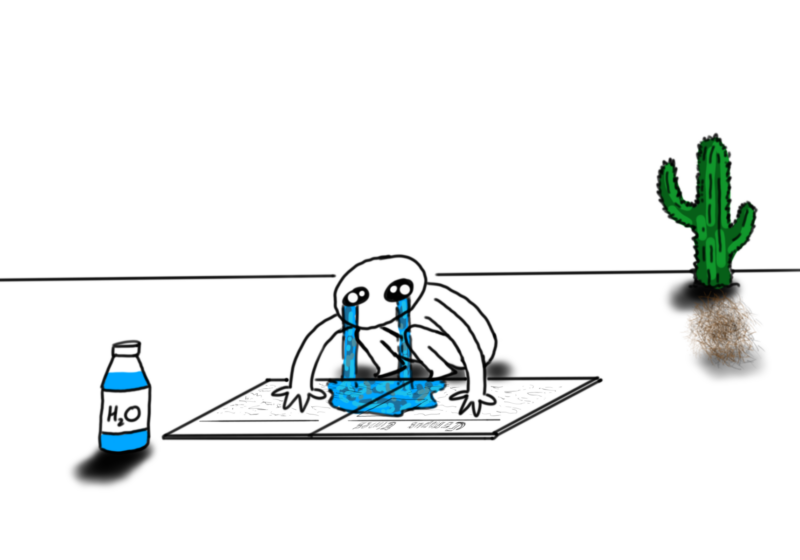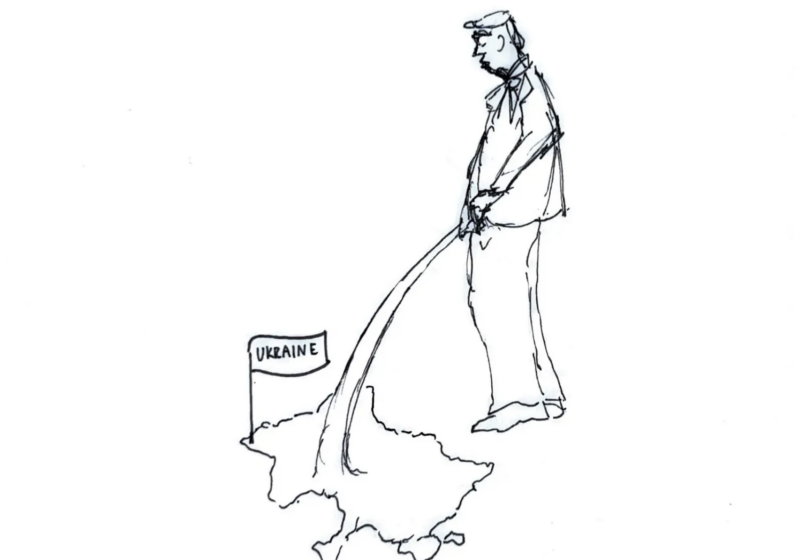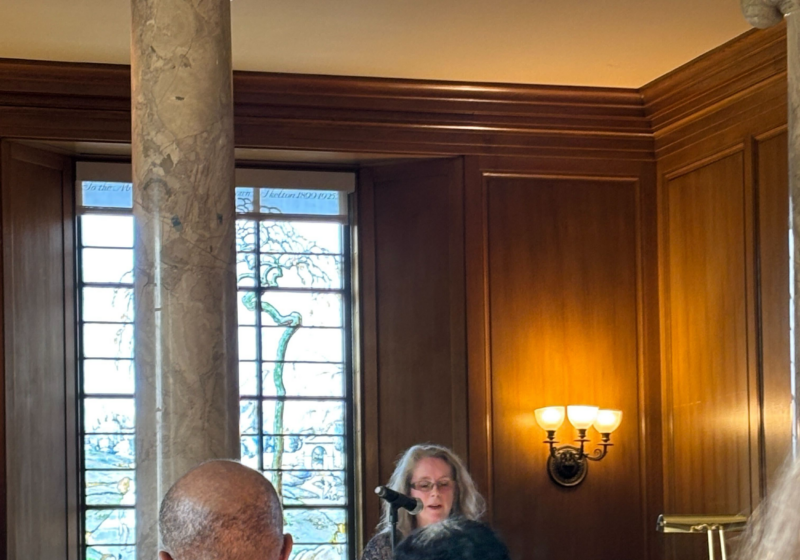When junior Elianor M.A. first moved to Rochester in 2018 as a first-year, she was ready to start her fresh new take on adulthood. But as the first semester came to a close, and another began, she learned that despite her fierceness to exceed her 15 year-plan, uncertainty had something else in mind.
She discussed her major setbacks in a virtual event with the Susan B Anthony Institute on Wednesday, titled “Find Strength in Stigma: One Student’s Journey to Resilience.”
The event focused on M.A.’s experiences as both a patient and student and her subsequent projects.
One such project is M.A.’s memoir-manifesto “Dealing with Dramedies,” which explores her journey of being diagnosed with a rare autoimmune disorder called necrotizing autoimmune myopathy and rising above its challenges. Additionally, the novel features M.A.’s interviews with acclaimed authors and actors including Caroline Kepnes, Dr. Jill Bolte Taylor, and Oscar nominee Nadine Labaki.
M.A.’s debut book, “Transcendent,” is a YA romance novel about navigating the past and future, was published in 2018.
M.A. has also won prestigious screenwriting contests such as Screencraft Pilot Launch and the Los Angeles Film Awards.
When she began her first semester at UR, M.A. felt as if everything was in place. She loved her classes, made new friends, and was starting to feel at home despite having moved across the world from Lebanon to the U.S. It wasn’t until finals week that she began to feel more exhausted than normal.
A diligent student, M.A. pushed through her worries, aced her tests, and went home for break. But when her symptoms escalated into extreme fatigue, her mom finally suggested she get tested. M.A. visited her doctor to be safe, but still thought she had nothing to worry about — until she got an alarming phone call.
On Jan. 22, 2019, while M.A. and her friend were having dinner, she received a voicemail from her doctor telling her that she needed to get to the hospital right away, because she would be going into kidney failure.
After rushing to the emergency room, M.A. said that “everything happened really fast.” She would go to the ER three more times, nearly die four times, and have surgery done while also taking exams, all before the age of 19.
At first, M.A’s autoimmune diagnosis seemed bleak. She had come to Rochester to start anew, yet she felt like her chance had dissipated.
But sitting on the sidelines of her life was not an option.
“My way of [staying] positive was throwing myself into work, M.A. said at the talk. “Instead of focusing on my drama, and letting that drama define my college career, I chose to define it.”
Of course, defining one’s college life and future while battling an invisible illness is not easy. “When [people] look at me, I seem fine walking down the street, but internally, every day it’s a battle,” M.A. said.
M.A.’s talk then shifted to a word that appeared in the title of the event: stigmatization.
“For me, [the word means] hidden strength, for a lot of reasons,” M.A. said. “One of the reasons is that most of the time, we’re the ones stigmatizing ourselves.”
For instance, M.A. said that when she was first diagnosed, she tried to conceal her struggles “by not wanting to talk about it and by always deflecting questions […] “I was creating the problem that I was escaping [from].”
Though stigmatization is at large in society, M.A. urged her audience to accept themselves and take control of their life instead.
“All your circumstances, the bad and the good — they’re a part of the movie of your life,” M.A. said. “A lot of the times, the bad stuff — the really dark, dark moments — are just one scene in this entire movie […]” M.A. said, looking into the camera. A smile spread across her face as she continued. So, in the description, are you going to let that one scene ruin the entire movie? I don’t think so […] I feel like you have a lot more to go, and a lot more to reflect on.”
Due to her daily medications making it a risk to be in an environment with sick patients, M.A. realized that becoming a doctor was no longer an option and sought to adapt to her circumstances.
“Instead of fixating on what I had been losing — which was my life-long dream and my long-term 15-year plan — I decided to see what I could gain.”
What M.A. gained was her career as a screenwriter and author.
An 18-year-old with no prior screenwriting experience, who grew up in Lebanon — a place where becoming either a lawyer, engineer, or doctor is the norm — M.A. said that she didn’t have much that encouraged her pursuit of professional storytelling.
But it was the career that kept her surviving.
When she wrote her first screenplay and submitted it to the Los Angeles Film Awards shortly after her first near-death experience, M.A. was surprised when she received the top prize as she had written it in only 21 days.
“For the first time in my life, I felt that my passion was validated,” M.A. said.
“In a way, I had this moment of clarity, and I realized what I really wanted. I could make a difference with my words as much as I could as a doctor seeing my patients.”
From then on, writing had become an art form that not only healed her but also fulfilled M.A.’s desire to make a difference.
“I feel like there is this sense of fearlessness when it comes to writing and not shying away from any subjects,” M.A. said. “I feel like I’m well-equipped enough to talk about anything that might be considered taboo or controversial because the [real] controversy is not being able to think for yourself and think independently.”
However, she had one more obstacle to tackle.
When the pandemic hit in March, M.A. had to face being locked indefinitely in her room again — something she had already done enough because of her disorder. But also because of her disorder, M.A. was used to change and uncertainty from learning to balance her hectic schedule split between the hospital and school. She decided to use the lockdown as an opportunity to explore another passion, which became taking care of her mental health.
“I come from a country where mental health isn’t even a real word […] so it’s not a subject that’s largely talked about,” M.A. said.
According to M.A., working all the time got her through the heartache of being treated so often, but it also kept her astray from her own mental clarity.
“A lot of us can relate to the pandemic giving us these moments of clarity, and this desperate need to connect with ourselves and others,” M.A. said. “I realized more than ever [that] I needed to actually start talking about what I was going through to other people.”
It was difficult at first, but M.A. began to open up about her autoimmune disorder and the struggles of living a triple life as a patient, student, and storyteller.
With a strong support group of friends and a great community, M.A. said that staying connected with others has aided in her ability to continue to strive. Taking time to herself through lockdown helped her become even stronger.
“It’s not selfish if you take some time off and it’s definitely not negative if you complain from time to time or just express your concerns [to] everyone else — that’s where the positivity is,” M.A. said.
Now, with her “Dealing with Dramedies” coming out this December , M.A. said that she thinks of her “present as a stepping-stone into the future.”
“You don’t have any guarantee that things are going to go the way that you want them to,” M.A. said. “But you do have a guarantee of how you want them to go — of how you want your life to be.”
At the end of her talk, M.A. had a message for the audience: “Embrace your journey, and embrace the people that love that about you.”







